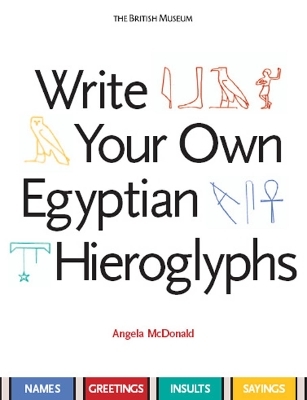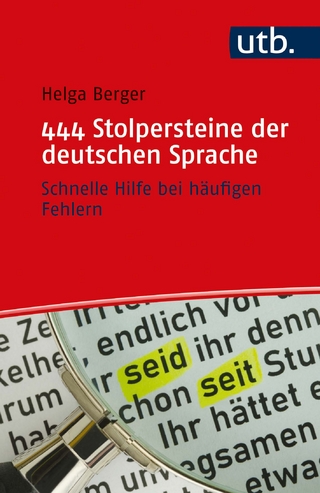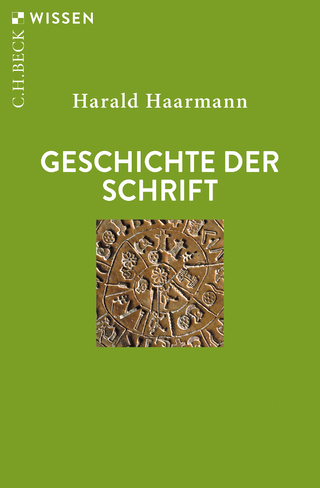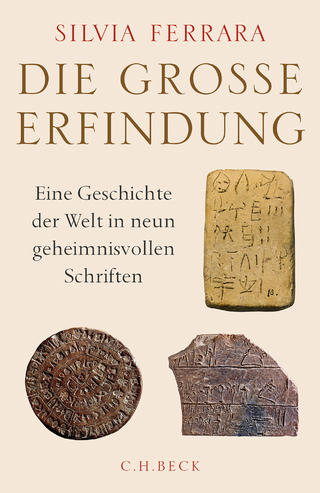
Write Your Own Egyptian Hieroglyphs
Names · Greetings · Insults · Sayings
Seiten
2007
British Museum Press (Verlag)
978-0-7141-1976-2 (ISBN)
British Museum Press (Verlag)
978-0-7141-1976-2 (ISBN)
A handy and colourful illustrated guide to reading, writing and understanding ancient Egyptian names, epithets, titles and phrases.
The Egyptians believed that the creator god Ptah brought the world into being by naming everything in it. Names had great power, and kings often over-wrote their own names on monuments of earlier rulers. A person’s name was a vitally important part of them, and the Egyptians were very concerned that their names should be recorded, remembered and spoken. Criminals and those who had fallen out of favour could be punished – wiped out of history – by having their names destroyed or defaced.
The hieroglyphic script provided a beautiful, flexible and expressive meaning to write the names of humans, gods and animals. Angela McDonald explains the meanings of Egyptian personal names and how they were made up (Rameses = “Ra has given birth to him”), and demonstrates how they were written in different ways to convey various shades of meaning.
Royal and divine names are always given special treatment. The Egyptians were not always formal, and nicknames were common. Even the names of pet animals are recorded in tomb paintings.
The Egyptians believed that the creator god Ptah brought the world into being by naming everything in it. Names had great power, and kings often over-wrote their own names on monuments of earlier rulers. A person’s name was a vitally important part of them, and the Egyptians were very concerned that their names should be recorded, remembered and spoken. Criminals and those who had fallen out of favour could be punished – wiped out of history – by having their names destroyed or defaced.
The hieroglyphic script provided a beautiful, flexible and expressive meaning to write the names of humans, gods and animals. Angela McDonald explains the meanings of Egyptian personal names and how they were made up (Rameses = “Ra has given birth to him”), and demonstrates how they were written in different ways to convey various shades of meaning.
Royal and divine names are always given special treatment. The Egyptians were not always formal, and nicknames were common. Even the names of pet animals are recorded in tomb paintings.
Angela McDonald lectures in Egyptology at Glasgow University. She has previously taught at Oxford University and at Liverpool University.
1. The importance of names in Ancient Egypt; 2. People and their names: how Egyptian names are written and what they mean; 3. Gods' names and epithets; 4. The animal world: how animal names express the nature of the creature; 5. Secret names and names for posterity; 6. List of useful Egyptian words and phrases.
| Erscheint lt. Verlag | 14.5.2007 |
|---|---|
| Zusatzinfo | Illustrated in colour and black and white throughout |
| Verlagsort | London |
| Sprache | englisch |
| Maße | 200 x 260 mm |
| Gewicht | 340 g |
| Themenwelt | Kinder- / Jugendbuch ► Spielen / Lernen ► Kreativität / Malen / Basteln |
| Geschichte ► Hilfswissenschaften ► Paläografie | |
| Geisteswissenschaften ► Sprach- / Literaturwissenschaft ► Sprachwissenschaft | |
| ISBN-10 | 0-7141-1976-8 / 0714119768 |
| ISBN-13 | 978-0-7141-1976-2 / 9780714119762 |
| Zustand | Neuware |
| Haben Sie eine Frage zum Produkt? |
Mehr entdecken
aus dem Bereich
aus dem Bereich
Schnelle Hilfe bei häufigen Fehlern
Buch | Softcover (2021)
UTB (Verlag)
18,00 €
Eine Geschichte der Welt in neun geheimnisvollen Schriften
Buch | Hardcover (2021)
C.H.Beck (Verlag)
25,00 €


